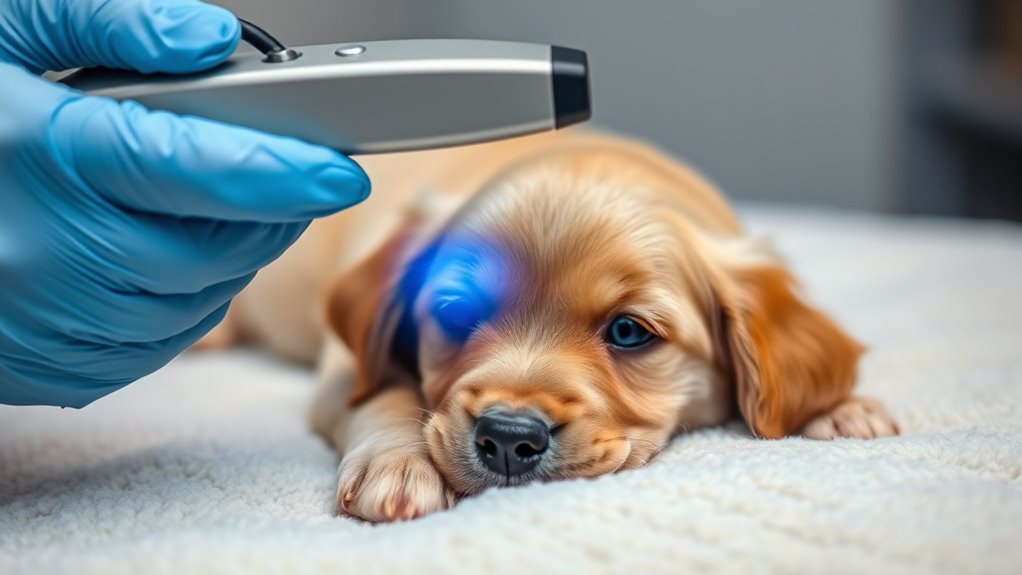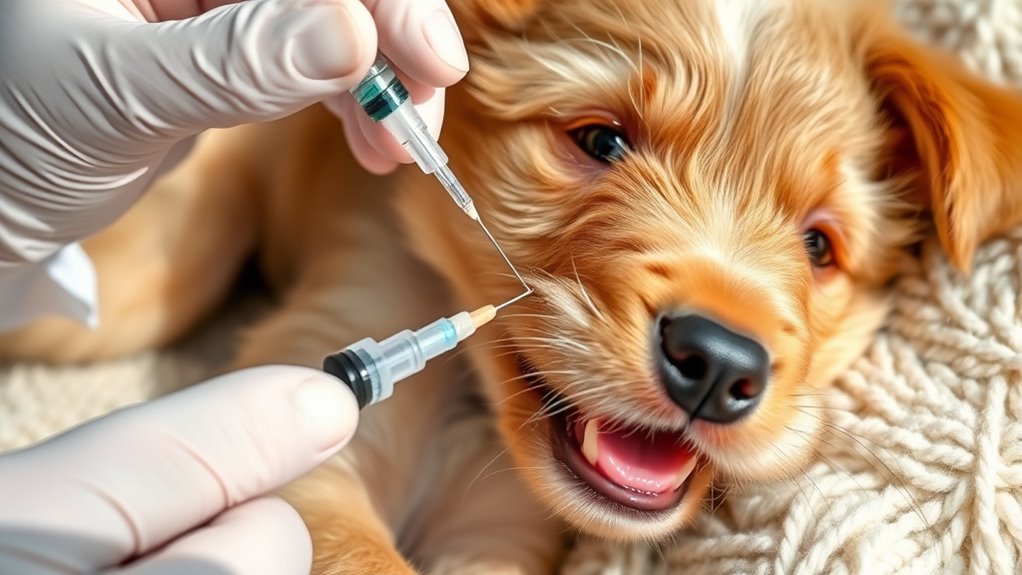Microchipping your puppy is a simple, effective way to guarantee permanent identification and help reunite you if your pet ever gets lost. The tiny device is implanted under your puppy’s skin, usually during a quick, painless procedure, and links to your contact info in a national database. By staying informed, you’ll understand the importance of microchipping and how it can protect your furry friend throughout their life. Explore more to learn the full benefits and process involved.
Key Takeaways
- Microchipping provides permanent, reliable identification that helps recover lost puppies quickly.
- The procedure is simple, minimally invasive, and usually painless, involving a tiny device implanted under the skin.
- Registering the microchip with your contact details ensures you can be contacted if your puppy is found.
- Routine scanning at shelters and vet clinics increases the chances of reuniting with your pet.
- Keeping your contact information current and regular vet check-ups ensure your puppy’s microchip remains functional.

Have you ever wondered how to guarantee your puppy can find its way back home if it gets lost? One of the most effective ways is through microchipping, a simple procedure that can make a huge difference. When you’re going through the adoption process, many shelters and breeders recommend or require microchipping for puppies. It’s a small, rice-sized device implanted under your puppy’s skin, usually between the shoulder blades. This tiny chip contains a unique identification number that links directly to your contact information in a national database. Unlike collars or tags, microchips can’t fall off or be easily removed, making them a reliable form of permanent identification.
Getting your puppy microchipped involves a straightforward veterinary procedure that’s quick and minimally invasive. During this procedure, your veterinarian will use a special needle to insert the chip just beneath the skin. The process is similar to a vaccination shot, so it’s generally painless and well-tolerated by puppies. After the implantation, your veterinarian will register your puppy’s microchip with your details, ensuring that if your puppy ever gets lost, anyone who finds them can scan for the chip and access your contact information. It’s vital to keep your contact details up to date in the database to guarantee you’re reachable if your puppy is found.
Getting your puppy microchipped is a quick, painless procedure that helps ensure they can be easily identified if lost.
Microchipping is especially important because it provides a permanent form of identification that survives most accidents or injuries. Collars and tags can fall off or be removed, but a microchip remains in place regardless of circumstances. This makes it an invaluable tool for reuniting lost pets with their owners quickly. Furthermore, many shelters and veterinary clinics routinely scan for microchips when a found pet arrives. If your puppy is microchipped, chances are much higher that you’ll be able to recover them swiftly, reducing stress for both of you. Additionally, alternative entertainment options like embedded microchip technology are emerging in the pet industry, offering new ways to ensure pet safety and identity.
Beyond the immediate benefits, microchipping also aligns with responsible pet ownership. It’s often a requirement in many communities and can be part of your puppy’s health record through veterinary procedures. Regular check-ups with your veterinarian will ensure the microchip remains functional and your contact information is current. Ultimately, microchipping offers peace of mind, knowing that if your puppy ever wanders off, you’ve taken a vital step to guarantee they can find their way back to you. It’s a small investment that provides significant security and helps protect your beloved pet for years to come.

ISENVO Pet Microchip Scanner Rechargeable RFID EMID Micro Chip Reader Scanner 134.2kHz 125kHz 15 Digits Pet Chip ID Scanner for Animal/Pets/Pigs/Dogs/Cats (190A)
【RFID Reader Operation Manual】1. Press the pet microchip to start the device, enter the scanning mode, and start…
As an affiliate, we earn on qualifying purchases.
As an affiliate, we earn on qualifying purchases.
Frequently Asked Questions
How Long Does a Microchip Last Inside a Puppy?
The microchip inside your puppy lasts a lifetime, with its duration longevity and chip durability estimated to be 25 years or more. Once implanted, it remains functional without needing replacement. You can trust that the microchip will continue to work well into your puppy’s adult years, providing a reliable way to identify and reunite with your pet if they ever get lost.
Can Microchips Cause Health Issues in Puppies?
Microchip safety is generally very high, and most puppies don’t experience health issues from it. The microchip is small and inert, posing minimal risk to your puppy’s health. Some puppies might have mild swelling or discomfort at the implantation site, but serious health problems are rare. To guarantee safety, always have the procedure done by a veterinarian and monitor your puppy afterward for any unusual signs.
Is Microchipping Painful for Puppies?
They say “no pain, no gain,” and microchipping your puppy is no exception. The procedure causes minimal microchip discomfort, and most puppies experience only a quick pinch. If your puppy has anxiety, gentle handling can ease their nerves. Overall, the microchip’s benefits in keeping your pup safe far outweigh the brief discomfort, making it a small price to pay for peace of mind.
What Should I Do if My Puppy’s Microchip Malfunctions?
If your puppy’s microchip malfunctions, you should promptly contact your vet for a microchip scan to verify the issue. If needed, request a microchip replacement to guarantee your pet stays protected. It’s essential to keep your contact information updated with the microchip registry. Regularly scanning your puppy’s microchip during vet visits can help catch issues early, giving you peace of mind that your pup can be identified if lost.
Are Microchips Mandatory in All Regions or Countries?
Regional regulations and legal requirements vary, so microchips aren’t mandatory everywhere. You should verify your local laws, as some areas require microchipping for puppies before adoption or sale, while others don’t have such rules. It’s essential to stay informed about your region’s regulations to guarantee compliance. Even if not mandatory, microchipping is highly recommended for your puppy’s safety and easier recovery if they get lost.

Manruta 8 Pack Pet ID Microchip Implant Kit for Cats and Dogs Small Puppies Kittens Unquie 15 Digit ID Chip Number Lifetime Registeration Online
{Microchip Quality is Very Important }:Manruta Microchip, from Germany ,well made with high quality bioglass ,last the life…
As an affiliate, we earn on qualifying purchases.
As an affiliate, we earn on qualifying purchases.
Conclusion
Think of microchipping your puppy as planting a tiny, unbreakable compass inside them. No matter where life takes your furry friend, this small device guides you back to each other, like a lighthouse shining through fog. It’s a simple act that creates a bond of safety and trust, ensuring you’ll always find your way home together. By microchipping, you’re giving your puppy a little piece of protection that lasts a lifetime.

BuddyID Complete Protection System, ISO Microchip with Pre-Paid Lifetime Registration, BuddyBadge® QR Collar Tag, No Annual Fees, SearchALERTS & SafePlaces Access, 1 Count
PET IDENTIFICATION COMPONENTS: Includes one ISO-compliant pet microchip and one QR collar tag designed to support pet identification….
As an affiliate, we earn on qualifying purchases.
As an affiliate, we earn on qualifying purchases.

Fi Nano Microchip for Dogs – 1-Pack – Free Lifetime Registration – Universally Scannable – Small Size…
FREE TO REGISTER AND UPDATE FOR LIFE INFORMATION FROM ANY SMARTPHONE OR COMPUTER AT NANO.TRYFI.COM
As an affiliate, we earn on qualifying purchases.
As an affiliate, we earn on qualifying purchases.










